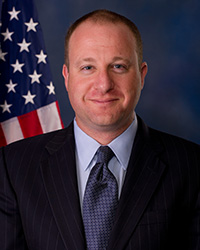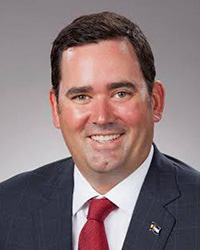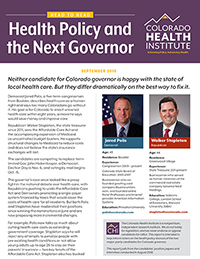
Head to Head: Health Policy and the Next Governor
Democrat Jared Polis, a five-term congressman from Boulder, describes health care as a human right and says too many Coloradans go without it. His goal is for Colorado to enact universal health care within eight years, a move he says would save money and improve care.
Republican Walker Stapleton, the state treasurer since 2011, sees the Affordable Care Act and the accompanying expansion of Medicaid as uncontrolled budget-busters. He supports structural changes to Medicaid to reduce costs and does not believe the state’s insurance exchanges will last.
The candidates are competing to replace term-limited Gov. John Hickenlooper, a Democrat. Election Day is Nov. 6, and voting by mail begins Oct. 15.
The governor’s race once looked like a proxy fight in the national debate over health care, with Republicans pushing to undo the Affordable Care Act and Democrats promoting a single-payer system financed by taxes that would cover the costs of health care for all residents. But both Polis and Stapleton have moderated their positions since winning the nominations in June and are now proposing more incremental changes.
For example, Polis now talks as much about cutting health care costs as extending government coverage. Stapleton says he will reject any attempts to penalize people with pre-existing health conditions or not allow young adults up to age 26 to stay on their parents’ insurance — two key tenets of the Affordable Care Act. Stapleton also has bucked religious conservatives by endorsing free long-term contraceptives to cut teen pregnancies and abortions.
The candidates split on marijuana regulation and their belief in government’s ability to effectively manage health care.
Polis: Universal Coverage Would Cut Costs
Polis endorsed Medicare for All — a national proposal to expand government-run health coverage for everyone, regardless of age — long before it became a political rallying cry for liberals. He opposed Colorado Amendment 69, a 2016 ballot measure that would have created a system of universal care, saying it was flawed in its approach.
Now, Polis is pushing for a multi-state universal coverage system. He says he would enact residency requirements, like those for college students who pay in-state tuition, to prevent Colorado from becoming a magnet for the sickest patients and those whose care is most expensive. He does not favor mandates to buy health insurance.
Polis also wants Colorado to partner with other states — he mentions Minnesota, Nevada and New Mexico as possibilities — to negotiate cheaper prices from pharmaceutical companies and create a larger pool of insurance customers to hold down costs for consumers and government.
“We’re generally about increasing access and reducing costs,” Polis said. “The two go hand in hand because when people have access to health care, they’re less likely to wind up uninsured and uncovered in an emergency room with a very high cost of care.”
If state and local elections go his way, Polis believes he could lead Colorado to “achieve close to universal coverage over the next eight years, or two terms as governor.”
What about costs? Polis won’t say specifically who would pay what. “It should cost less. We’re paying too much today,” Polis said. “I mean, in effect, the only reforms that I support are ones that save money.
“If you look at health care as a percentage of the GDP (gross domestic product) in our country, it’s roughly twice what it is in any other western industrialized nation that has universal health care. Again, there’s no health care system that’s perfect, but fundamentally, we should be spending less, and if we do, we should be able to cover everybody,” Polis said.
When asked if his goal was for Coloradans to stop paying premiums to private insurers and instead pay taxes to the government for health care coverage, Polis replied, “That’s sort of a very vague 20,000-foot concept. … I think what people are interested in, what voters are interested in is paying less in health care, saving money on prescription drugs, and however we do that — and there’s a whole variety of ideas — is fine.”
Among those ideas: Resurrecting a customer-owned cooperative insurance company and opening the state employee benefit plan or Medicaid to expand coverage options for people who currently don’t qualify for either program. Colorado had an insurance co-op that was launched by Affordable Care Act grants, but it folded in 2015 after just two years.

Jared Polis
Democrat
Age: 43
Residence: Boulder
Experience:
- Congressman 2009 – present
- Colorado State Board of Education: 2001-2007
- Businessman who co-founded greeting card company Bluemountain.com, and founded online florist ProFlowers and Internet provider American Information Systems
Education: Princeton University
Stapleton: Universal Coverage Would Break the Bank
Stapleton is far more skeptical that government is the answer. Pointing to a legislature that has been known to fight endlessly over programs that cost a few million dollars, Stapleton questioned the ability of state government to manage a massive universal care program, which he said could cost $25 billion.
“If you’re going to propose universal care, it should be incumbent on you to explain how you plan to pay for it,” Stapleton said. He expressed concern that it would be “easier to qualify for health insurance than it is to get a driver’s license. From a cost standpoint, it’s an unlimited pool of potential people that would be covered.”
Colorado is one of a minority of states that fully embraced the Affordable Care Act. It expanded eligibility for Medicaid to include low-income adults without children, and it created its own online health insurance exchange. (Thirty-three states and the District of Columbia have expanded Medicaid. Only 11 states and the District of Columbia run their own exchanges. The rest rely on the federal exchange, at least to some degree.)
Stapleton believes it’s “inevitable” that the state insurance exchange will fold, and he thinks Medicaid expansion is unsustainable. He predicts Congress eventually will react to the rising cost of insuring people with lower incomes by ending Medicaid expansion and providing states with block grants to figure out their own coverage options.
However, Stapleton is not calling to repeal the state’s health insurance exchange, Connect for Health Colorado, because closing it down abruptly could cause tens of thousands of people to lose their health insurance. And he doesn’t plan to reverse Colorado’s Medicaid expansion.
One way to trim the state’s Medicaid bill, he said, is to reduce unnecessary visits to the emergency room. He pointed to a UnitedHealthcare subsidiary, Optum, a health and technology company he said “can now perform 90 percent of the services an emergency room can perform at 10 percent of the cost in an individual’s home. Why would we not take advantage of that innovation and work with a company like Optum to reduce the cost of Medicaid in Colorado?”
Stapleton said a serious problem with any expansion of Medicaid and Medicare is that the programs “chronically underpay” physicians for medical services. Stapleton said he is concerned an expansion of those two government health programs will lead doctors to leave Colorado.
In 2016, Medicaid and Medicare in Colorado reimbursed hospitals just over 70 percent of their costs of treating patients in the programs, according to the Colorado Healthcare Affordability and Sustainability Enterprise.
Stapleton also supports requiring random drug tests of Medicaid members. “I think if you are getting subsidized federally, and you’re on federal assistance, and you’re using drugs, the state should have the right to test you,” Stapleton said. An aide later explained that Stapleton’s drug-testing criteria extended only to Medicaid patients and not Medicare recipients or others receiving various federal benefits.

Walker Stapleton
Republican
Age: 44
Residence:
Greenwood Village
Experience:
- State Treasurer 2011-present
- Businessman who served as former chairman of the commercial real estate company Sonoma West Holdings
Education: Williams
College, London School of Economics, Harvard University (MBA)
Regulating Marijuana
The candidates hold very different views on state regulation of marijuana.
Polis voted yes on state ballot initiatives in support of medicinal and recreational marijuana. In Congress, he has become one of the leading supporters of marijuana legalization.
By contrast, Stapleton voted no on the cannabis initiatives. Though he would not support repealing legalization — “Given the number of states that have legalized now, I don’t think that’s practical” — Stapleton does want to raise the legal age for medical marijuana from 18 to 21 and tighten restrictions for other consumers.
“I don’t think that you should be 18 and qualify for a medical card when you need to be 21 as a retail buyer of marijuana,” Stapleton said.
He also would raise taxes on medical marijuana, which currently is not subject to the steep excise and sales taxes of retail marijuana.
Polis said it would be unwise and unfair to boost the age for medical marijuana from 18 to 21. He sees medicinal pot as a painkilling alternative to addictive opioid prescriptions.
“Seventy-five percent of opioid addiction begins with a prescription,” Polis said, “and so if there are less addictive and harmful alternatives to opioids that can work for pain management in certain cases, medical marijuana can be one of those (treatments).”
Polis’ priority related to marijuana would be “driving any remaining drug dealers out of business.” He said the state could do a better job of monitoring the safety of the product sold in dispensaries, but that “by and large Colorado’s model is an example to other states.”
Both candidates expressed support for state investigations of pharmaceutical companies selling opioid painkillers to Coloradans.
Views on Other Health Issues
Stapleton says he believes that health care can be improved by integrating primary care and behavioral health. Increasing access to integrated physical and behavioral health care is a major goal of Colorado’s State Innovation Model, which is run by the Hickenlooper administration with funding from the federal Centers for Medicare & Medicaid Services.
The candidates differ on how they talk about abortion. Polis supports abortion rights. Stapleton declined to say what he would do if the Supreme Court overturns Roe v. Wade and returns the issue to states to decide. “That’s a federal issue,” he said. “When I became the treasurer of Colorado, I swore to uphold the Constitution, and you don’t get to pick and choose the parts of it that you like and don’t like.”
Both Polis and Stapleton expressed support for the Colorado Family Planning Initiative, a state program that provides low-income women with access to long-acting reversible contraceptives (LARCs) at reduced or no cost. It is credited with sharp reductions in teen births and abortions, although some Republicans in the legislature oppose funding for long-acting contraceptives because they consider it a form of abortion.

What Powers Does the Governor Have Over Health Policy?
Actions a governor can do alone:
- Appointing directors of key department (with Senate confirmation)
- Appointing members to the Board of Health and other important rulemaking bodies (with Senate confirmation)
- Changing the number of insurance rating regions
Actions that require a law passed by the legislature:
- Repealing Connect for Health Colorado
- Changing Medicaid eligibility
Actions that would require a vote of the people:
- New taxes to support any health program
- Repeal of medical or retail marijuana legalization
Actions that require federal action:
- Changing Medicare
- Regulating insurance for self-insured employers
STAPLETON: Separate CBD and THC
Stapleton would separate the regulation of two key chemicals in marijuana: cannabidiol (CBD) and tetrahydrocannabinol (THC).
“If you talk to anybody that understands the marijuana plant, you talk to the scientists or doctors that have done research, they will tell you the most medically viable part of the plant is the CBD part of the plant,” Stapleton said. “That is used in pincher drops for kids with epilepsy, the NFL players are suing to be able to use it as massage cream as an anti-inflammatory.
“I do not think that the federal government should be classifying CBD as a Schedule I drug,” he said. “I think it needs to be separated from THC, which is the other active component in marijuana that causes you to order Domino’s a couple times a night and watch reruns of a show you’ve already seen.
“You would think that our medical cards would then distinguish between the CBD and THC part of the plant and yet they don’t. So I’m in favor of medical cards distinguishing between CBD and THC.”
POLIS: Like-Minded States Can Work Together
With President Trump and congressional Republicans so hostile toward the Affordable Care Act, Democrats increasingly are turning to state governments to expand health care coverage.
If elected, Polis said he would aim to partner with other states to create a multi-state system to provide universal health insurance.
“By no means are we the only state that’s looking at reforms in this direction. There’s a number of states, of course, that are going to be looking at expanding coverage and access,” Polis said.
“The larger the risk pool, the greater the savings, the greater the leverage to negotiate for better rates,” he said. “So, depending on what the voters choose this November, there could very well be leadership in states like Nevada, New Mexico, or Minnesota that is interested in pursuing this direction, or not.”
The two men also agree that they personally pay too much for health insurance. Stapleton estimated he pays $15,000 a year as a state employee to cover himself, his wife, and their three children on a UnitedHealthcare policy. Polis said he pays $16,944 a year for unsubsidized Anthem coverage on the Colorado health exchange for himself, his partner, and their two children.
In 2017, the average premium in Colorado for family coverage through an employer was $19,300 per year. Businesses paid most of the price, and the average employee share was about $5,300.
Conclusion
The election presents a choice between two candidates with different ideas about the role of government in health care. Polis envisions a greater role through the creation of a multi-state single-payer system. Stapleton thinks the state government is already too heavily involved through Medicaid, which now covers nearly a quarter of the state population.
But neither candidate seems likely to immediately dismantle the current system. Stapleton is not calling for major cuts to Medicaid or a repeal of Affordable Care Act programs. Polis is taking a measured approach on switching to a single-payer system, saying it may take nearly a decade to achieve. So don’t look for Colorado’s health policy in 2019 to be Republican red or Democratic blue. It’s more likely to remain a shade of purple.
By Mark Obmascik, special to the Colorado Health Institute. Other CHI staffers contributing to this report: Brian Clark, Cliff Foster, Joe Hanel, Allie Morgan, Jackie Zubrzycki
The Colorado Health Institute is a nonpartisan, independent research institute. We do not lobby for legislation, and we never endorse or oppose candidates for office. This report is intended to help inform voters on the health policy stances of the two major-party candidates for Colorado governor.
This report pulls from the candidates’ position papers and interviews conducted in August 2018.

